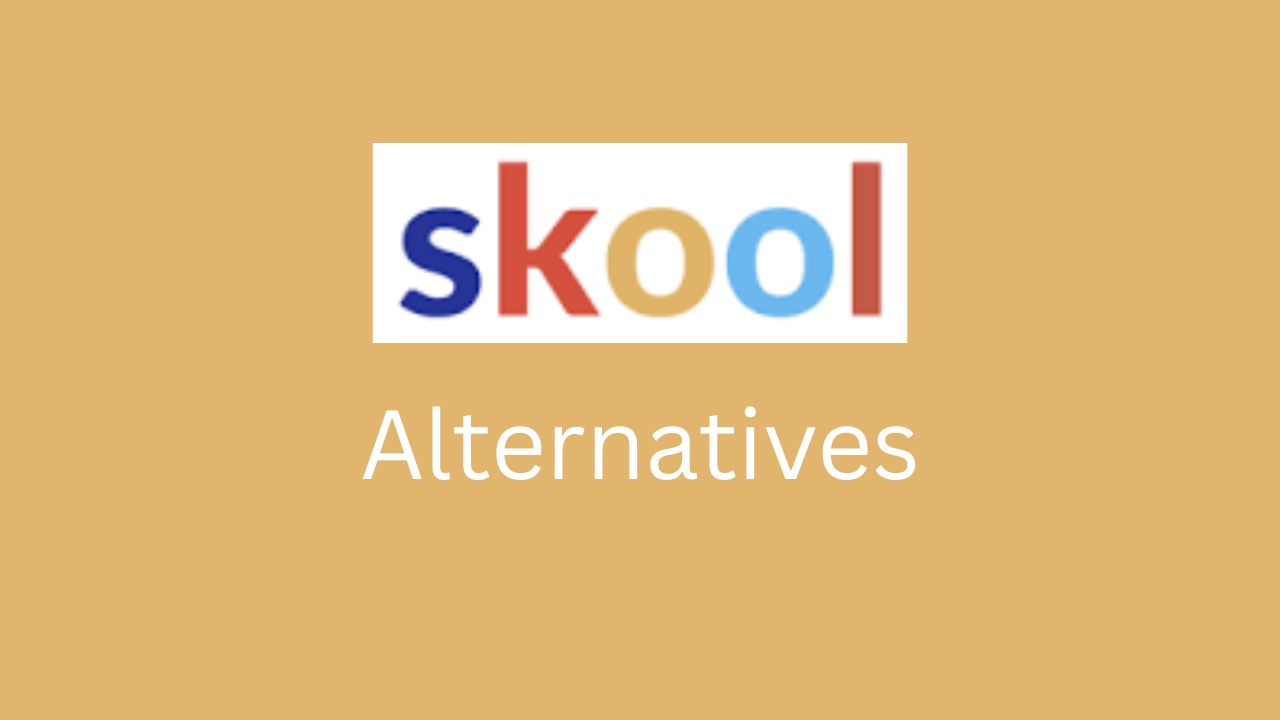Skool is a great platform for building your online community. But not all its features can meet your needs — and that can make you start looking for Skool alternatives.
Maybe you’ve outgrown its simplicity, or you’re craving more control over things like automation, marketing, or branding. Skool keeps things clean and minimal, which is awesome for beginners — but once you start scaling, you might notice it lacks tools like built-in email funnels, advanced customization, or flexible pricing options.
That’s why so many creators, coaches, and educators are switching to platforms like Kajabi, Circle, Mighty Networks, or Systeme.io — tools that give you the freedom to grow your community and run your business in one place.
In this guide, we’ll break down the 10 best Skool alternatives for 2025, compare their key features, and help you figure out which one best fits your goals, budget, and business model.
What to Look for in the Best Skool Alternatives
Before you jump into trying every platform on the list, it helps to know what really matters when replacing Skool. Because while Skool makes things simple, not every alternative will offer the same balance of community, learning, and monetization tools.
Here’s what you should pay attention to when choosing the right fit:
1. Course Creation Tools
If courses are a big part of your business, make sure your new platform has a flexible course builder. Look for features like video hosting, drip content, and progress tracking. Platforms like Thinkific, Teachable, and Kajabi do this really well.
2. Community Engagement Features
Skool shines with its built-in community. So, if community is your main focus, choose a platform that offers interactive spaces, private groups, and chat tools. Circle and Mighty Networks are excellent if you want a social, high-engagement setup.
3. Marketing & Automation
One of Skool’s biggest drawbacks is the lack of built-in marketing tools. You’ll want a platform that lets you run emails, funnels, and automations under one roof. Systeme.io, GoHighLevel, and Kajabi are strong choices here.
4. Customization & Branding
Skool’s minimalist design keeps things clean but limits how much you can personalize. If you care about your brand identity, pick a platform that lets you customize your pages, emails, and member areas to match your brand colors and voice.
5. Payment Flexibility
Whether you sell one-time courses or recurring memberships, having flexible payment options matters. Look for platforms that support subscriptions, one-time payments, and multiple currencies with easy checkout experiences.
6. Integrations & Scalability
As your business grows, you’ll need more tools working together — CRM, email, analytics, and more. Platforms like GoHighLevel or Kajabi integrate with nearly everything, while simpler ones like Podia keep things lean for small creators.
7. Pricing That Fits Your Stage
Not every platform is built for every budget. Some are affordable but basic; others are premium with all the bells and whistles. The trick is to choose a tool that meets your current needs without paying for features you won’t use yet.
Look, the best Skool alternative isn’t just the one with the most features — it’s the one that aligns with how you actually work.
The 10 Best Skool Competitors (Full Comparison)
1. ThriveCart — The Skool Alternative for Selling Courses and Digital Products

If your main goal is to sell online courses, memberships, or digital products with high-converting checkout pages, ThriveCart is an excellent Skool alternative to consider.
Unlike Skool, which centers around community and course engagement, ThriveCart focuses on helping you maximize revenue through smart upsells, one-click payments, and built-in affiliate tools — all wrapped in a clean, user-friendly platform.
And with its ThriveCart Learn feature, you can even host your courses and memberships directly inside the platform — no extra integrations needed.
Key Features
- High-converting checkout and sales funnel builder
- ThriveCart Learn course platform (included free)
- One-click upsells, bump offers, and A/B testing
- Affiliate management dashboard
- Lifetime pricing option (no monthly fee)
- Integrations with Stripe, PayPal, and major email tools
Pros
- No recurring subscription costs (lifetime license)
- Robust sales and checkout customization
- Built-in affiliate system to boost revenue
- Reliable, simple course hosting with ThriveCart Learn
Cons
- No native community or engagement features like Skool
- Lacks a built-in mobile app for learners
ThriveCart vs Skool: Which Is Better for Selling Courses?
If your main focus is selling — not managing a community — ThriveCart is the stronger choice. Its checkout system is one of the best in the industry, helping you convert more buyers with less friction.
Skool, on the other hand, offers a more social and structured learning experience, which makes it better for ongoing engagement rather than one-time sales.
Is ThriveCart Worth It as a Skool Alternative?
Definitely — especially if you’re tired of paying monthly fees for course or membership tools. ThriveCart’s lifetime pricing makes it one of the most affordable long-term Skool alternatives.
Pair it with a free community tool like Discord or Circle, and you’ve got a complete setup for selling, teaching, and engaging your audience — without recurring costs.
For creators and course sellers who value ownership, sales performance, and affordability, ThriveCart is a smart Skool alternative that gives you total control over your revenue.
2. Kajabi — The All-in-One Skool Alternative for Serious Creators

If you’re looking for a Skool alternative that can handle your entire online business — not just your community — Kajabi is a top contender. It’s built for creators, coaches, and educators who want everything in one place: courses, memberships, websites, email marketing, and automations.
Unlike Skool, which focuses heavily on simplicity, Kajabi gives you professional-grade control over every part of your digital business — from lead generation to customer retention.
Key Features
- Full website and landing page builder
- Course and membership hosting
- Built-in email marketing and automations
- Sales funnels (“Pipelines”)
- Analytics and progress tracking
- Integrated checkout and affiliate management
Pros
- True all-in-one system — no need for extra tools
- Beautiful, customizable design templates
- Native automations and marketing built in
- Scales smoothly as your business grows
Cons
- Higher monthly cost compared to Skool
- Slight learning curve for beginners
- Community features are not as engaging as Skool’s
Is Kajabi Better Than Skool for Course Creators?
In most cases — yes, if your focus is on building a full-fledged online business rather than just a community. Kajabi’s built-in automations, funnels, and marketing tools give it a serious edge for selling and scaling.
If community engagement is your main priority though, Skool’s simplicity and social design still win that round.
Kajabi vs Skool: Which Platform Offers Better Marketing Tools?
No competition here — Kajabi easily outshines Skool in marketing. With Kajabi, you can build landing pages, send automated emails, track funnels, and upsell products without relying on third-party apps. Skool, on the other hand, requires external integrations for most of that.
Also Read:
7 Best Kajabi Alternatives (Affordable Options for Course Creators)
Systeme io vs Kajabi: Which All-in-One Platform is Better?
Thrivecart vs Kajabi — Which One’s Better for Your Online Business?
3. Clickfunnels — The Sales-Focused Skool Competitor for Marketers

If your main goal isn’t building a community but selling digital products, memberships, or coaching offers, then Clickfunnels might be a stronger fit than Skool.
Clickfunnels was built for one thing: conversions. It’s the go-to platform for marketers who want to attract leads, nurture them through automated funnels, and convert them into paying customers — all without needing a ton of tech setup.
While Skool focuses on engagement and simplicity, Clickfunnels shines when it comes to structured, high-converting sales flows.
Key Features
- Drag-and-drop sales funnel builder
- Checkout pages and order bumps
- Built-in email marketing (Follow-Up Funnels)
- Affiliate program management
- A/B split testing for conversions
- Integrations with CRMs, webinars, and payment gateways
Pros
- Powerful funnel and conversion tools
- Great for selling courses, memberships, and coaching offers
- Strong community of marketers and resources for growth
- Easy to integrate with other tools and CRMs
Cons
- No real “community” features like Skool
- The dashboard can feel cluttered for beginners
- Expensive plans for access to full features
Clickfunnels vs Skool: Which Is Better for Selling Digital Products?
If sales and automation are your top priorities, Clickfunnels wins hands down. Skool doesn’t offer built-in funnels or email sequences — you’d need separate tools to replicate what Clickfunnels does natively.
But if you care more about building relationships and keeping members active in a community space, Skool still holds the edge.
Can Clickfunnels Replace Skool for Memberships or Courses?
Technically, yes — but with limits. Clickfunnels can host your course or membership content, though it’s not as smooth or visually appealing as Skool’s layout. It’s perfect for launch-based businesses but less ideal for long-term member engagement.
4. Systeme.io — The Budget-Friendly All-in-One Skool Alternative
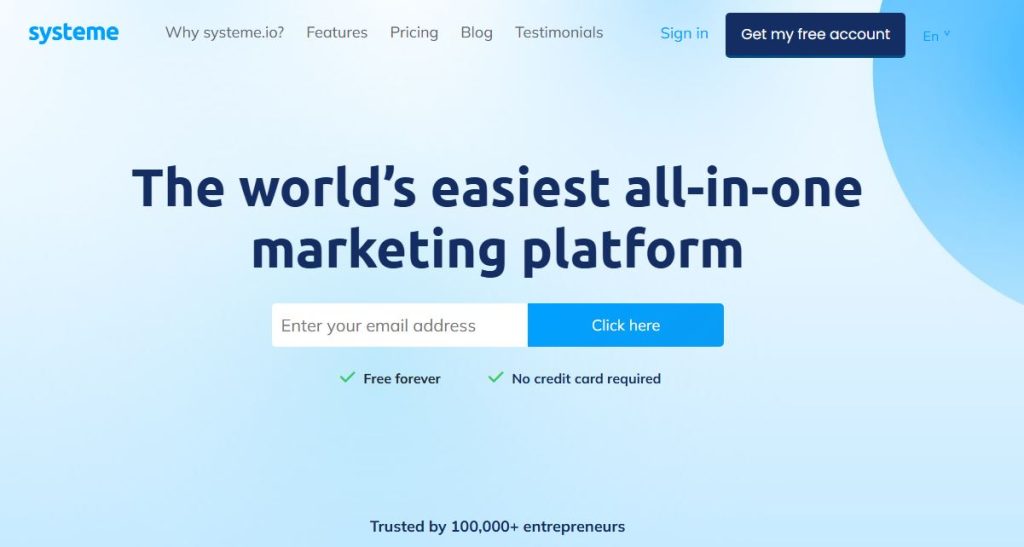
If you love the idea of an all-in-one business platform like Kajabi or Clickfunnels but don’t love their price tags, Systeme.io might be exactly what you need.
Systeme.io is a low-cost Skool alternative that gives you sales funnels, email marketing, automation, membership sites, and affiliate management — all in one place. And the best part? You can get started for free.
It’s built for creators, coaches, and small business owners who want to build and scale without juggling multiple tools or paying hundreds every month.
Key Features
- Funnel builder with pre-designed templates
- Unlimited email marketing (even on free plans)
- Membership and online course hosting
- Affiliate management system
- Workflow automations and tagging
- Built-in blog and website creator
Pros
- Free plan with access to core features
- Easy to use for beginners
- Simple automations and email campaigns
- Affordable paid plans with no hidden costs
Cons
- Limited design customization options
- Community features are basic compared to Skool
- UI isn’t as polished as premium tools like Kajabi
Systeme.io vs Skool: Which Is Better for Small Creators?
For new creators or small businesses on a tight budget, Systeme.io is the smarter pick. You get a full suite of marketing and automation tools that Skool doesn’t offer — all without extra subscriptions.
However, if your main focus is on nurturing a tight-knit community, Skool still has the edge in user engagement and experience.
Is Systeme.io a Good Free Alternative to Skool?
Absolutely. Systeme.io’s free plan lets you create funnels, send emails, and host courses — something Skool doesn’t offer. It’s perfect for testing your ideas before committing to a paid platform.
Just note: while it’s powerful for its price, you’ll trade off some design polish and advanced community options.
5. Circle — The Modern Community Platform Alternative to Skool
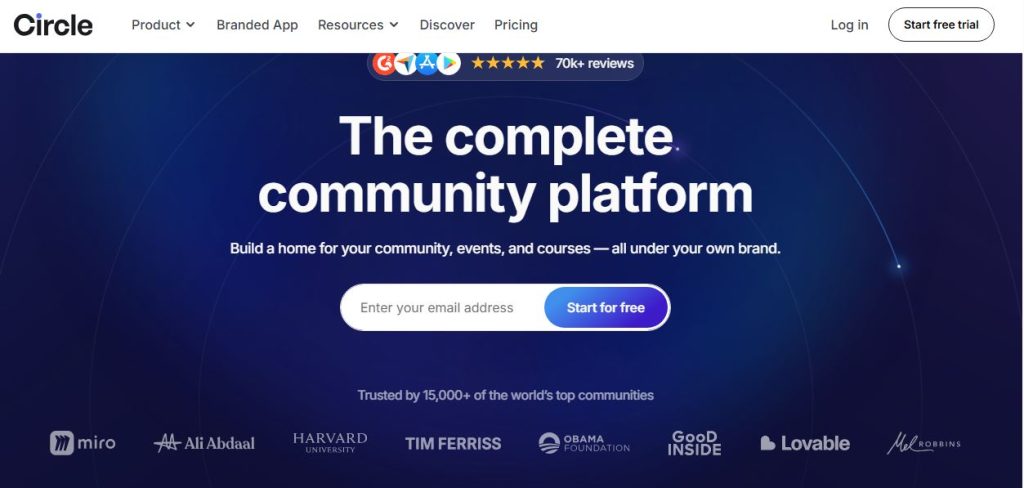
If you love how Skool builds community but wish you had more control, better design, and deeper engagement options, Circle is your best bet.
Circle was designed from the ground up for creators and brands that lead with community. It combines forums, live events, courses, and group chats in a single, beautiful interface — and it does it better than almost anyone else in this space.
It’s used by coaches, membership site owners, and even big brands who want a place that feels like their own private social network.
Key Features
- Customizable community spaces and discussion threads
- Built-in events, livestreams, and course areas
- Member directories and private groups
- Direct messaging and engagement analytics
- Zapier and API integrations for automation
- Embeddable widgets to connect with your main website
Pros
- Clean, modern design that members love using
- Excellent engagement tools for communities
- Great for combining courses, coaching, and conversation
- Integrates smoothly with other tools (like ConvertKit, Zapier, and Notion)
Cons
- No built-in funnels or email marketing (needs external tools)
- Costs can add up with add-ons or scaling
- Less focus on automation compared to all-in-one platforms
Circle vs Skool: Which Is Better for Building Online Communities?
Both platforms focus on community, but they take different approaches. Skool keeps things simple and structured, while Circle gives you more flexibility and branding freedom.
If you want your community to look and feel like a branded hub — with custom spaces, events, and private areas — Circle easily outshines Skool.
Is Circle a Good Skool Replacement for Membership Sites?
Yes — especially if your community is central to your business. Circle lets you sell memberships, host live calls, and even create mini-courses all within the same space. The difference? You have far more room to personalize the experience for your members.
6. Mighty Networks — The Skool Alternative Built for Deep Community Engagement
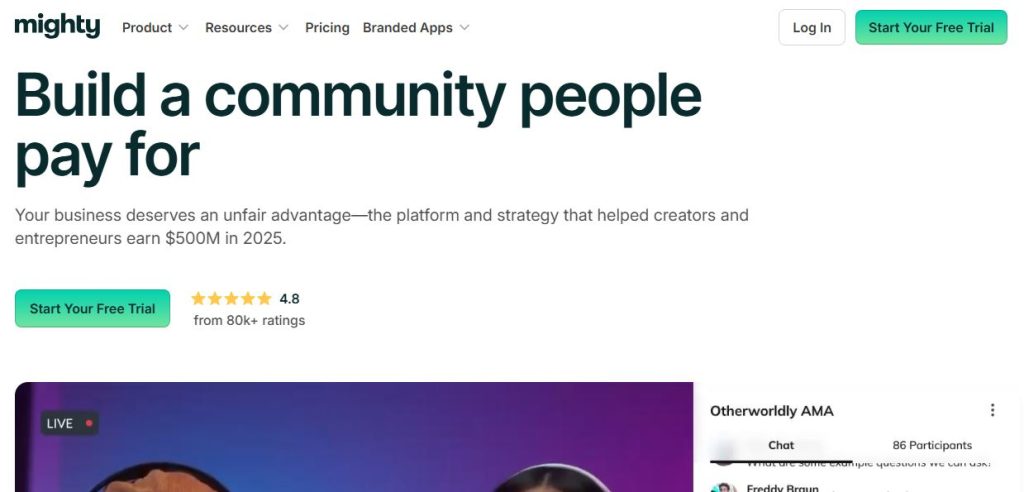
If your top priority is creating a lively, interactive community — not just hosting content — then Mighty Networks is one of the strongest Skool alternatives you can choose.
While Skool focuses on simplicity, Mighty Networks leans heavily into connection and engagement. It gives you all the tools to build an active, branded community that feels like its own social network — complete with courses, live events, and even a mobile app for your members.
Key Features
- Community spaces, group discussions, and private messaging
- Built-in online courses and live sessions
- Native mobile app for iOS and Android
- Event hosting and paid memberships
- Personalized member feeds and content recommendations
- Integrated payments and analytics
Pros
- Strong focus on social engagement and community growth
- Excellent mobile experience for members
- Built-in tools for live sessions and paid memberships
- Customizable branding options for creators and teams
Cons
- Limited marketing tools compared to Skool competitors like Kajabi or GoHighLevel
- Advanced features (like branded apps) are only available on higher plans
- Setup can take a bit longer due to the many features available
Mighty Networks vs Skool: Which Builds Stronger Communities?
If your goal is to create an interactive space that feels like a social platform, Mighty Networks easily beats Skool. Its activity feed, event options, and app-based accessibility keep members far more engaged.
However, if you want something simpler and more structured — especially if your focus is on courses rather than ongoing interaction — Skool may still fit better.
Is Mighty Networks Better for Hosting Paid Memberships Than Skool?
Yes — Mighty Networks gives you greater flexibility in setting up multiple membership tiers, pricing options, and community access levels. You can even host multiple sub-communities under one brand, something Skool doesn’t currently allow.
For creators who want to nurture a buzzing, mobile-friendly community with deep connections and ongoing engagement, Mighty Networks stands out as one of the most community-driven Skool alternatives on the market.
7. GoHighLevel — The Automation-Powered Skool Alternative for Agencies and Marketers

If you’ve ever wished Skool had more automation, CRM tools, or advanced marketing capabilities, GoHighLevel might be exactly what you’re looking for.
GoHighLevel (often called “GHL”) is a Skool alternative built for agencies, coaches, and advanced marketers who want everything — funnels, CRM, email, SMS, automations, memberships, and even white-label options — under one roof.
Unlike Skool, which focuses on community and simplicity, GoHighLevel is built for scaling and systemizing. It’s ideal for people who want serious control over how they attract, nurture, and convert their leads.
Key Features
- All-in-one CRM and pipeline management
- Drag-and-drop funnel and website builder
- Email, SMS, and voicemail automation
- Membership and course hosting
- Calendar booking and client management tools
- White-label options for agencies
- Workflow automation and AI-powered follow-ups
Pros
- Extremely powerful automation and marketing tools
- Perfect for agencies and advanced marketers
- Can fully replace multiple tools (Clickfunnels, Mailchimp, Calendly, etc.)
- White-label features let you rebrand the entire platform
Cons
- Steeper learning curve for beginners
- Community and UI aren’t as simple as Skool’s
- Overkill if you only need courses or a small membership site
GoHighLevel vs Skool: Which Has More Automation Features?
There’s no comparison here — GoHighLevel dominates when it comes to automation and marketing. With built-in workflows, triggers, and CRM pipelines, it’s built to handle every part of your customer journey.
Skool, while easier to use, simply doesn’t offer the same marketing firepower or integration depth.
Is GoHighLevel Overkill for Solo Creators Compared to Skool?
It can be. If you’re a solo creator or coach just starting out, GoHighLevel might feel a bit complex. But if you’re managing clients, running multiple funnels, or need advanced automation, it’s a total game-changer.
In short, GoHighLevel is a Skool alternative for power users — not hobbyists.
If you’re ready to automate your entire business — from lead generation to client onboarding — GoHighLevel gives you everything you need to grow fast, all in one place.
Also Read: 7 Best Go High Level Alternatives
8. Teachable — The Simple, Course-Focused Skool Competitor for Educators and Creators

If you love Skool’s simplicity but wish you could focus purely on course creation, Teachable might be your ideal match.
Teachable is one of the most popular Skool alternatives for creators who care about teaching, not tech. It’s built to make launching and selling online courses effortless — without needing extra tools or complex integrations.
While Skool combines courses and community, Teachable is laser-focused on helping you create, host, and sell educational content smoothly and professionally.
Key Features
- Drag-and-drop course builder with video, quizzes, and downloads
- Secure payment system with global tax support
- Affiliate program for promoting your courses
- Coaching products for 1:1 or group sessions
- Custom branding and domain options
- Analytics and student progress tracking
Pros
- Beginner-friendly and easy to set up
- Reliable checkout and payment options
- Great for coaches, teachers, and educators
- Affordable compared to most all-in-one tools
Cons
- No native community features like Skool
- Limited email marketing and automation tools
- Fewer customization options compared to platforms like Kajabi
Teachable vs Skool: Which Is Better for Hosting Online Courses?
If your primary focus is teaching, Teachable wins easily. It’s made for smooth course delivery, student tracking, and simple payment collection.
However, if community engagement and discussions are a big part of your offer, Skool might still suit you better since it naturally integrates both learning and social interaction.
Can Teachable Replace Skool for Creators Who Want Simplicity?
Yes — if you don’t need a private community. Teachable gives you everything required to build and sell courses under your own brand, with a clean interface and minimal setup.
You can always add a community tool later (like Circle or Discord) if you want the best of both worlds.
If you’re a coach or course creator who just wants to teach, sell, and keep things easy, Teachable is one of the most reliable and straightforward Skool alternatives out there.
Related Post: 8 Best Teachable Alternatives & Competitors
9. Discord — The Free and Flexible Skool Alternative for Real-Time Communities

If you want to build an active, engaging online community without paying for expensive tools, Discord is one of the most flexible Skool alternatives you can find.
Originally built for gamers, Discord has quickly evolved into a go-to community platform for creators, coaches, and course owners who want to host group discussions, live sessions, and Q&A spaces — all for free.
While Skool organizes members around structured courses and topics, Discord thrives on real-time communication and organic conversations.
Key Features
- Voice, video, and text chat channels
- Roles and permissions for managing members
- Screen sharing and live streaming
- Bots and integrations for automation
- Private servers for paid or exclusive communities
- Mobile and desktop apps for easy access
Pros
- 100% free to use with generous limits
- Real-time connection and instant engagement
- Highly customizable with bots and integrations
- Great for casual or interactive learning communities
Cons
- Lacks native course hosting and monetization tools
- Can feel chaotic without proper setup
- No built-in payment or automation system
Discord vs Skool: Which Builds Stronger Community Connections?
If your goal is constant interaction, Discord wins. Members can chat, hop on voice calls, or share updates instantly — something Skool doesn’t offer.
However, Skool provides a cleaner, distraction-free environment that’s better suited for structured learning and professional groups.
Can Discord Replace Skool for Courses or Paid Memberships?
Not fully. You’ll need third-party tools (like Patreon, Gumroad, or Memberful) to handle payments and access control. But as a community companion to your course, Discord is unbeatable — especially for engagement and retention.
If you’re building a tight-knit, high-energy community and want a free alternative to Skool, Discord delivers everything you need to connect and communicate — no subscription required.
10. Podia — The Creator-Friendly Skool Alternative for Courses and Communities
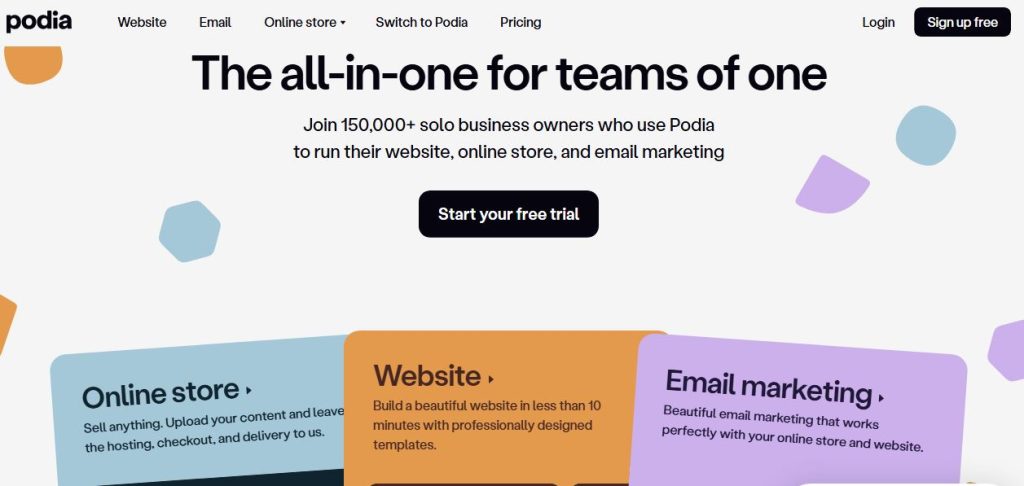
If you’re looking for a simple, all-in-one Skool alternative that helps you sell courses, memberships, and digital products without any tech headaches, Podia deserves a top spot on your list.
Podia is built for creators who want to teach, build community, and sell digital offers all in one place. It’s less rigid than Skool, more affordable than Kajabi, and much friendlier for beginners who want to launch quickly.
Unlike Skool, which focuses mainly on community learning, Podia gives you full freedom to combine learning, selling, and audience building — no coding, no plugins, no stress.
Key Features
- Course builder for video, text, and downloadable content
- Built-in community spaces for members
- Email marketing and newsletters
- Digital product sales (ebooks, templates, etc.)
- Affiliate programs for creators
- Custom website builder with checkout integration
Pros
- Intuitive, beginner-friendly setup
- Combines courses, products, and community in one platform
- No transaction fees on paid plans
- Clean and modern interface your students will love
Cons
- Limited automation and advanced marketing tools
- Community features aren’t as robust as Circle or Mighty Networks
- Fewer integrations compared to GoHighLevel or Kajabi
Podia vs Skool: Which Is Better for Creators Who Sell Digital Products?
If you sell more than just courses — say, templates, guides, or coaching — Podia is the stronger choice. It handles all types of digital products in one dashboard, whereas Skool is more community- and course-focused.
However, if your core offer revolves around group learning and social interaction, Skool’s structured community format may feel more cohesive.
Is Podia a Good Skool Alternative for Beginners?
Absolutely. Podia is one of the easiest ways to start selling online — even if you’ve never built a website or online course before. Its clean design, built-in email tools, and no-fuss setup make it perfect for solo creators and small teams.
For creators who want a balanced mix of education, community, and commerce, Podia hits the sweet spot — easy, affordable, and built with creators in mind.
Related Post: 8 Best Podia Alternatives for Course Creators & Digital Sellers
11. Thinkific — The Professional Skool Alternative for Scalable Online Education

If you’re serious about creating structured, professional-grade online courses and want a more enterprise-level alternative to Skool, Thinkific is a top contender.
Thinkific is built specifically for educators, coaches, and organizations who want full control over their student experience — from content delivery to branding and analytics. While Skool keeps things simple and community-driven, Thinkific focuses on education quality, scalability, and customization.
It’s one of the most polished Skool alternatives for creators ready to grow their online learning business into a real brand.
Key Features
- Advanced drag-and-drop course builder
- Custom website and landing page builder
- Student progress tracking and completion certificates
- Quizzes, assignments, and community features
- Multiple instructors and admin roles
- Integrations with email and CRM tools (like ActiveCampaign, HubSpot, etc.)
Pros
- Extremely professional and flexible for course delivery
- Great student management and reporting tools
- Built-in community and discussion areas
- Custom domains, white labeling, and brand control
Cons
- Pricier than beginner-friendly options like Podia or Systeme.io
- Less focus on real-time engagement compared to Skool
- Takes longer to set up for complete beginners
Thinkific vs Skool: Which Is Better for Online Education?
If you want to run a professional online academy or training program, Thinkific wins. It’s designed for structured learning, certificates, and deep analytics — things Skool doesn’t emphasize.
But if your main focus is keeping members talking, connecting, and learning together, Skool’s simpler layout may create a better sense of community.
Is Thinkific Worth Switching to From Skool?
Yes — if you’re scaling beyond community-based learning and need more professional tools for managing courses, students, and instructors. It’s especially powerful for teams or businesses that want to offer a full-fledged learning platform under their own brand.
For course creators and coaches who want more control, customization, and growth potential, Thinkific stands out as one of the most reliable and professional Skool alternatives on the market.
Final Thoughts: Which Skool Alternative Is Right for You?
At the end of the day, there’s no one-size-fits-all answer — the best Skool alternative depends on what you’re building and how you want to connect with your audience.
Here’s a quick way to choose:
- If you want all-in-one power: Go with Kajabi, Thrivecart, ClickFunnels or GoHighLevel — they give you everything from funnels to automation under one roof.
- If your focus is community: Circle and Mighty Networks shine for engagement, live events, and branded member experiences.
- If you’re budget-conscious: Systeme.io and Podia deliver tons of value without the hefty monthly cost.
- If you’re all about teaching: Teachable and Thinkific are ideal for structured learning and professional online courses.
- If you prefer casual, real-time chat: Discord is unbeatable for free, high-energy communities.
Skool is still a fantastic platform — simple, clean, and perfect for community-driven courses. But as your business evolves, you might need more automation, customization, or flexibility.
That’s where these tools come in. Whether you’re growing a coaching brand, running a membership site, or launching a course empire, one of these Skool alternatives will fit your next stage of growth perfectly.
Bottom line:
👉 Choose the platform that matches your workflow, not just your budget. The right tool should feel like a natural extension of how you teach, sell, and connect with your audience.
FAQs About Skool Alternatives
1. What is the best Skool alternative overall?
If you want a platform that can grow with your business, Kajabi is one of the strongest Skool alternatives. It combines courses, marketing, email automation, and community tools in one powerful dashboard. However, if your focus is purely on community engagement, Circle or Mighty Networks are better fits.
2. What’s the best free alternative to Skool?
Systeme.io and Discord are the best free options. Systeme.io gives you a complete marketing and course platform for $0 (perfect for beginners), while Discord lets you host and grow your community for free with voice and chat channels.
3. Is Skool better than Kajabi?
It depends on your goals. Skool is simpler and built around community-first learning, while Kajabi is more advanced — offering marketing funnels, automations, and full website control. If you prefer ease and engagement, choose Skool. If you want everything under one roof, go with Kajabi.
4. Can I host courses and a community in one place without Skool?
Yes. Tools like Podia, Circle, and Thinkific let you combine learning and community features in one platform. Podia is best for creators who sell multiple digital products, while Thinkific gives you a more professional classroom feel.
Which Skool alternative is best for agencies and marketers?
GoHighLevel is built specifically for agencies and advanced marketers. It offers CRM management, automations, funnels, SMS, and white-label capabilities — everything Skool doesn’t include natively.

